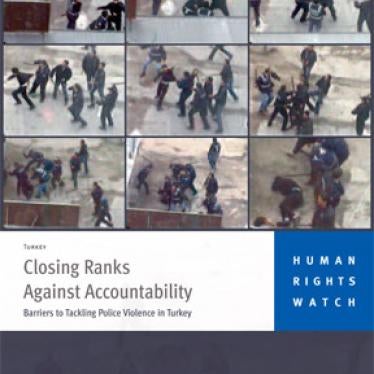(Istanbul) - The heavy sentences for nine prison and police officials for torture, leading in one case to death, is a momentous verdict that should signal a renewed effort by the Turkish government to end torture in custody, Human Rights Watch said today. The case is the first in which a Turkish court convicted a senior prison official for torture by guards under his command.
The convictions in an Istanbul court on June 1, 2010, were for the torture death of Engin Çeber, an activist with the Rights and Freedoms Association, a political association. Çeber died in an Istanbul hospital on October 10, 2008 after being repeatedly beaten in police custody and in prison. An autopsy report by the Forensic Medicine Institute concluded that he had died from a brain hemorrhage as a result of blows to the body and head and that his injuries were commensurate with torture.
"The authorities in Turkey have been notorious for protecting torturers," said Emma Sinclair-Webb, Turkey researcher at Human Rights Watch. "The Çeber verdict should signal that the Turkish justice system will no longer turn a blind eye to torture and other ill-treatment."
Three guards and a senior official from Metris Prison were sentenced to life in prison. Two additional prison guards were each sentenced to prison terms of seven years and three months for torturing Çeber and two fellow activists, Özgür Karakaya and Cihan Gün. A Human Rights Watch representative monitored the trial. Three police officers were also convicted in the case.
The conviction of the senior prison official, Fuat Karaosmanoğlu, for Çeber's death is particularly noteworthy, Human Rights Watch said. Karaosmanoğlu was convicted for torture carried out by guards under his command, for having known about the torture, and for having failed to stop it. Previously, in almost all investigations into human rights violations by the security forces or public officials in Turkey, senior officers and officials have been absolved of responsibility. Karaosmanoğlu's conviction should send a strong message that senior officials will be held accountable for serious abuses by those under their command, Human Rights Watch said.
Members of the police and gendarmerie tortured Çeber, Karakaya, Gün, and another fellow activist, Aysu Baykal, before the three men were transferred to Metris Prison and Baykal to a women's prison. The court sentenced two police officers to seven years and six months for torturing Çeber, Karakaya, and Gün while still in police custody, and a female officer to two years and six months for torturing Baykal.
The court convicted in all 19 officials for their role in the activists' torture. A prison doctor was sentenced to three years and one month for falsifying documents claiming the inmates had been examined by medical staff on their arrival at the prison. Other prison officers received five-month suspended sentences for negligence and failure to report a crime. A gendarmerie special sergeant received a five-month suspended sentence for intentional injury, while two other gendarmes were acquitted.
Background
Çeber, Baykal, Gün, and Karakaya were arrested in the Sarıyer district of Istanbul on September 28, 2008. The four, all activists with the Rights and Freedoms Association, had been selling a socialist journal Yürüyüş in the street and had been among a small group conducting a peaceful protest against the shooting by the police of Ferhat Gerçek, a fellow member of their association. Gerçek had been shot by the police a year earlier, on October 7, 2007, while selling Yürüyüş in another district of Istanbul, leaving him paralyzed from the waist down.
Çeber, Baykal, Karakaya, and Gün were initially detained at the local police station and transferred the following day to prison pending trial for "resisting the police." The four reported to their lawyers that they had been beaten in police custody. Medical reports documented their injuries. Çeber, Gün, and Karakaya also told their lawyers that they were subsequently beaten by gendarmes on arrival at Metris Prison and by prison guards in the reception ward of the prison. Çeber also told his lawyer days before his death that he was being beaten regularly by prison guards for refusing to stand up during the daily head count. He subsequently collapsed and was transferred to a hospital, where he died on October 10, 2008.
The Çeber case garnered significant public attention and media coverage in Turkey, not least because then-Minister of Justice Mehmet Ali Sahin issued an unprecedented public apology to Çeber's family. However, the official response in the Çeber case stands in stark contrast to that of most cases of torture and ill-treatment in detention. Turkish authorities routinely fail to conduct prompt, effective, and impartial investigations into allegations of torture, and courts often fail to hold Turkish officials accountable despite overwhelming evidence of their guilt.
Human Rights Watch receives credible reports of torture and ill-treatment in and outside places of detention in Turkey and has repeatedly expressed concern that Turkish courts are notoriously lenient toward members of the security forces who are charged with abuse or misconduct, contributing to impunity and the persistence of torture and other ill-treatment. Long delays and the lack of thorough and impartial investigations by prosecutors also contribute to impunity, Human Rights Watch said.
Prosecutorial investigations have still not been concluded or trials have failed to progress to conclusion, for example, in many of the cases documented in a December 2008 Human Rights Watch report "Closing Ranks against Accountability: Barriers to tackling police violence in Turkey."
"The Çeber case highlights the Turkish authorities' failure to protect detainees from torture in spite of improved procedural protections in recent years," Sinclair-Webb said. "The convictions in the Çeber case should signal a renewed commitment to end torture in Turkey, once and for all."







